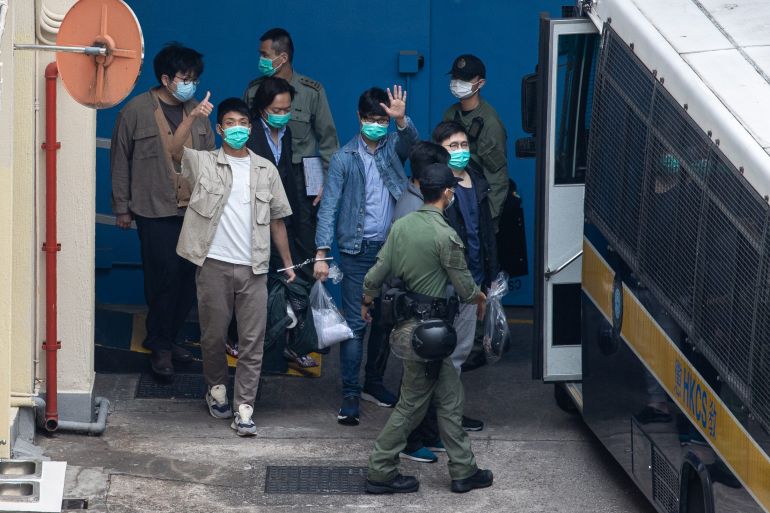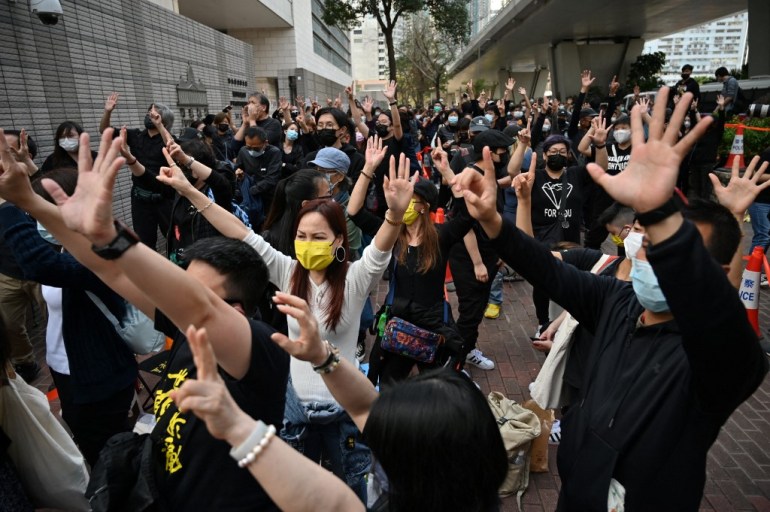Bail hearing for Hong Kong dissidents continues for third day
Former lawmaker condemns treatment of 47 pro-democracy defendants facing national security charges as ‘inhumane’.

A marathon bail hearing in Hong Kong has entered its third day, as dozens of pro-democracy activists returned to court after being charged with “subversion” under the territory’s national security law in a case that reignited international concern over Beijing’s crackdown on dissent.
The group were back in the dock on Wednesday to hear arguments from the legal teams of the last eight defendants.
Keep reading
list of 4 itemsHong Kong ‘subversion’ case resumes after marathon first day
UN rights chief decries abuses in Xinjiang, arrests in Hong Kong
‘Freedom, justice’: Why Hong Kong people are moving to the UK
Police arrested 47 of the city’s best-known dissidents on Sunday for “conspiracy to commit subversion” in the broadest use yet of security legislation that Beijing imposed on the city last June.
The defendants represent a broad cross-section of Hong Kong’s opposition, from veteran former lawmakers to academics, lawyers, social workers and youth activists.
Beijing has moved to quash dissent in semi-autonomous Hong Kong after huge and sometimes violent pro-democracy demonstrations in 2019.
With so many arrested at once, Hong Kong’s judiciary has struggled to deal with the sheer caseload as well as the legal questions of the broadly worded security law, which removes the presumption of bail for non-violent crimes.
Under the law, which was imposed directly from Beijing, bypassing the territory’s own legislature, defendants may only be granted bail if they can persuade a court they no longer pose any kind of national security risk.
All those charged with a national security crime so far have been held on remand, even when they have agreed to restrictive measures such as house arrest and making no public statements.
Prosecutors have asked the court to remand the group into custody for the next three months to allow police time to continue to build their case against them.
Lawyers for each defendant have spent the previous two days pushing for bail, arguing late into the night. They argue the police should not be detaining people while they are still investigating a case.
A bail hearing continues for dozens of democrats arrested under the security law. Pro-Beijing protesters are among those gathered outside the courthouse.https://t.co/qm9lQx42C7 pic.twitter.com/wwT6Qrg4LL
— Hong Kong Free Press HKFP (@hkfp) March 3, 2021
‘Inhumane’ treatment
The alleged offence for the 47 facing subversion charges was organising an unofficial primary election last summer to choose the best candidates for the legislative elections that were due to take place that September. The polls have since been postponed, but the pro-democracy camp had hoped to secure sufficient support to secure a majority that would enable it to scrutinise and block legislation proposed by the government.
Chinese and Hong Kong officials have claimed the primary was an attempt to “overthrow” the city’s government, and therefore a threat to national security.
The first day’s hearing only ended in the early hours of the morning when one of the defendants collapsed from exhaustion. She and a number of other defendants – including one with heart disease – had to be taken to hospital.
During Tuesday’s hearing, lawyers and the defendants themselves complained they had barely had any sleep since the arrests on Sunday and had been unable to wash or change their clothes.
Among those who were in court on Wednesday was Ventus Lau, a 27-year-old protest organiser. He managed to slip a note to his girlfriend, writing that the defendants finally got to take a shower on Tuesday night, and “had some time to sleep”.
Lau also said that the defendants were “really touched” by the expression of support by supporters who gathered outside the court to condemn the arrests.
Among the protesters was former lawmaker Fernando Cheung.
In an interview with the Hong Kong Free Press, Cheung said the treatment of the defendats was “inhumane”.
A smaller group of pro-Beijing protesters were also present, according to videos posted on social media.
‘Largest subversion prosecution’
Experts say the case is China’s largest subversion prosecution in decades, made possible by the recent expansion of mainland-style national security laws into Hong Kong.
“I think it’d be the largest batch of subversion cases since 1989,” Bing Ling, a professor of Chinese law at the University of Sydney, told AFP news agency, refererring to the aftermath of Beijing’s brutal crackdown in Tiananmen Square when scores of student leaders were prosecuted and jailed.
Critics, including many Western powers, have accused China of effectively outlawing opposition politics and destroying the freedoms and autonomy it promised to maintain for at least 50 years when the territory was handed over by the British in 1997.

China has defended its Hong Kong crackdown, saying it must restore stability after 2019’s protests, and ensure only “staunch patriots” are allowed to run the city.
Separately, a minor on Wednesday became the youngest person so far to plead guilty to rioting during 2019’s huge pro-democracy protests, when he admitted to throwing a petrol bomb at police.
The teen, who cannot be named for legal reasons, was 14 years old at the time of his arrest in November 2019.
The judge accepted advice from the city’s correctional services and sent the 16-year-old boy to a detention centre, an alternative to prison for young offenders.
The period of detention will be decided by the correctional services, with a minimum duration of one month and a maximum of half a year.
“The court must make a balance between society’s interests and helping young offenders,” District Judge Ernest Lin ruled.
More than 10,000 people have been arrested in relation to the 2019 demonstrations – about 40 percent of them students.